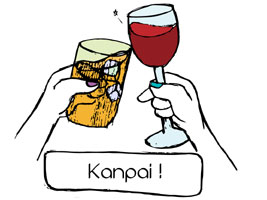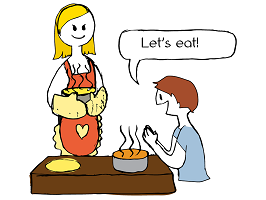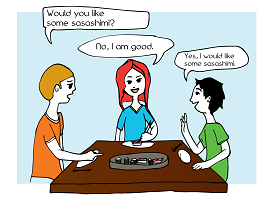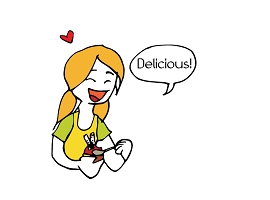Chapter 5
Homestay
Objectives (what you should be able to do in this chapter) and
Evaluations:
| 100 levels (Beginners):
Speaking and Listening Objectives:
To be able to use some useful phrases at a dining situation.
To be able to introduce your-self.
To be able to briefly talk about your family members.
To be able to ask/talk about dates, days of the week, month, years,
using a calendar.
To be able to use “casual (direct-style) verbs in conversation.
To be able to refuse food politely.
To be able to use –na adjectives.
To be able to distinguish two different adjectives.
To be able to make negative forms of adjectives.
To be able to write a Thank you card to the homestay family.
Writing and Reading Objectives:
To be able to write a card to introduce yourself.
To be able to write a thank-you card to a homestay.
How you will be evaluated?
Required items:
Three images (hard copy or digital) that you will show to your homestay
family to talk about yourself such as your family, friend, hometown,
university, etc..
A web camera with a microphone and a whiteboard with a
black pen (or a thick black pen and paper).
First, you will be asked to scan your room,
on and under the desk and chair, and compute area with your web camera.
If I have not met you in person, I will ask you to show me your student
ID (or any photo ID). All the instructions will be done in Japanese
using the Classroom Instructions in the chapter 0.
No English is allowed to be spoken by a test taker unless the instructor ask
you to do so. All the test has to be completed in 10 minutes so f
you cannot respond to a question in several seconds, please say "すみません、わかりません
or わすれました。 つぎ おねがいします"
Speaking and Listening Skills: Written situations
will be shown for you to act out the situations with the instructor.
Please be able to understand what your homestay (the instructor plays
their roles) would
say, and be able to play "you" part/role in the sample
conversations so that you can act out the situations with the instructor
to do some shopping. Please practice with the video practices as
well. Situation will be similar to the dialogues in the text and
sample situations that you were asked to create as assignments. In this
chapter, you DO need to COMPREHEND and SPEAK in direct/casual styles.
Reading and Writing:
You will be asked to write some phrases or Kanji (please follow stroke orders of
each letter/Kanji characters). Also you will be asked to read
signs and/or reading passages written in Japanese aloud to the
instructor. After reading them, you will be asked to answer in
Japanese or English to show your reading comprehension.
|
200 levels (Intermediate): The test needs to be
taken by Thursday of the week.
In addition to the above, you will be asked to write cards to a
fictitious homestay family including all the grammar
structures introduced in this chapter. Let the instructor know when you
are ready to take the test.
Pick 20 new kanji on your own and submit the
list (Kanji, its meanings, & Kana writings) to the instructor. You
can chose them from the sample conversation, writings, internet search,
etc. |
Click here for the Chapter 5 Kanji
(please refer to the kanji glossary as well.)
Direct lik:
https://appserv02.uncw.edu/tealvision/player.aspx?VID=jJvp%2f%2bOlDp4%3d
Calendar
Vocabulary Glossary Key Word: “calendar” “calendar-dates” “calendar-months”
“calendar-week-day” “calendar-year”
Click here to practice
しがつ よっか
April 4th
ごがつ じゅうごにち
May 15TH
(たなかさんの)
たんじょうびは いつですか。
When is (Mr. Tanaka’s) birthday?
6月22日にアメリカにかえります。 I
go back to America on June 22nd.
らいしゅうの 木曜日にアメリカにかえります。I
go back to America next week.
なにどし うまれ ですか。 What is your Eastern zodiac (which year of animal were you born
in?)
Find
out your Eastern Zodiac.
Refer more at the references.
Sample Conversation 1: Dining situations
Vocabulary Glossary Key Word: “adjectives-na”
Vocabulary Glossary Key Word “Plain forms of verbs”
Click here to practice
“Plain forms of verbs.
” Re-learn the verbs and find out how to divide verbs into the Class 1, 2, and 3 categories and
conjugations.
Grammar :
“likes and dislikes”
Click here to learn the in-group and out-group
vocabulary of Family members.
Click here to learn and practice the
words to express skills.
Audio Files for Listening and speaking
Bettie is meeting her homestay family (HF), Mr. Kawasaki, in Japan and
presenting a gift from the U.S. |
|
You:
はじめまして.
(...)です。
(...) と よんでください。 よろしくおねがいします。 |
It is my first time meeting you. Please call me (...).
Nice to meet you (Please
do me a favor of your acquaintance). |
|
HF:
はじめまして。
ようこそ いらしゃいました。 じゃ、行きましょうか。 |
How do you do. Welcome. You have come all the way/ Let's go. |
|
(After going into the house and settle down and homestay mother or
parents are not too busy preparing a dinner, ) |
|
You:
これ、アメリカからの お土産です。 これは、おとうさんに。ぼうしです。 これは おかあさんに。 Tシャツです。 それから、これは、(..first
name +.くん、...first name +ちゃん、or) 子どもさんに。わたしの 好きな おかしです。
どうぞ。 |
This, souvenir from
America. This
is a cap for the father. This is a T-shirt for the mother. And
then, this is for (the boy (first name), for the girl (first name)) or
children.
(this is) my favorite sweets.
Please (accept it).
Make sure you wrap all the gifts nicely. Do not expect
Japanese to open your gift right away. Average Japanese do not
open the gift in front of the presenter. |
|
HF:
ありがとう。
じゃ、ごはんにしましょうか。 |
Thank you very much. Shall we start a meal? |
|
You:
おてつだい しましょうか。 |
Shall I (can I) help you? |
|
HF: つかれているでしょう? |
You must be tired, I imagine. |
|
You:
いえ、だいじょうぶです。 てつだいます。 |
No. I am fine. I will help (you). |
|
HF: じゃ、おねがいします。 これを (テーブルに)もっていって (ください)。 |
Well then, please take this ( to the table). |
|
After meal is on the table and everyone sits down (but mother may be
still working in the kitchen.) |
|
|
HF: おさけは? |
(Alcohol) a drink? |
|
You:
いいえ、けっこうです。未成年ですから。 水で けっこうです。 |
No, thank you. (polite refusal).
Since I am under aged (19 or younger), water is fine. |
|
HF: 水? ジュースもあるよ。 |
Water? We have a juice also. |
|
You: .
じゃ、ジュースを
いただきます。or
いえ、水で だいじょうぶです。
|
Well then, I will have
juice. or No, water is fine. |
|
HF:
(when everyone gets a drink) じゃ 、かんぱい しましょう。 かんぱい。 |
Let's toast. Cheers! |
You:
かんぱい。いただきます。
 |
Cheers! (I will) eat. It is said to the host/hostess before starting a meal. Literally means,
“I humbly receive/accept.”
 |
|
HF: おさしみ(生の魚)は だいじょうぶ (ですか)。 |
(can you handle/eat/are you ok with) raw fish? |
|
You:
はい、だいじょうぶです。 なんでも 食べます。 でも、なっとうは ちょっと にがてです。 それから、トマトは だめです。 アレルギーなんです。 |
I
am fine (with raw fish). I eat anything. but
I (politely) decline natto (your offer of food since I do not like it much.).
Also, tomato is no good. I am allergic (to it). |
|
HF:
へーえ。 |
I see. |
 |
Note: In Japan, it is not customary to show people around the house
(especially a personal space such as a bedroom). Guests are usually stay in a
living room or a kitchen area where you eat together. If you need to use
toilet, you should say " トイレ おかりしても(or つかっても)いいですか May borrow (use)
toilet?" to ask permission. The Japanese toilet and the bath are separate
rooms. In your case, you are a guest as well as a family member you
can use the above phrase or simply say " トイレはどこですか。" In Japan, traditionally,
women work in the kitchen and man waits for meals to be served. There
fore, if you are a female, you can go into the kitchen to help the homestay mother
but if you are a male and try to help her, they may insist that you should relax in
the living room. Nowadays that many male family members (especially young
generations) help the mother/the cook but it really depends on the family. My
recommendation is at least offer your help saying ”なにか てつだいましょうか or
おてつだいしましょうか。”
Sample Conversation 2: Casual Talking
Vocabulary Glossary Key Word: “verbs”
Grammar Glossary Key Word: “verbs plain forms”
Click here to learn and practice the plain/casual/dictionary forms
of verbs.
Click here to learn Na-adjectives.
Click
here to learn and practice how to express skills.
Most Japanese homestay families are interested in your country, town, American
families, etc. While you are eating, they may ask about your family.
Let's talk about family members and show some photos of family, friends, and
your hometown, university, and more.
Audio files for Listening and Speaking
You are getting a bit more relaxed so your speech style is getting more
casual by eliminating ですand using plain/dictionary forms of verbs. |


 |
|
HF: どうぞ、たくさん 食べて(ください)ね。 |
Please eat a lot. |
|
You: おいしそう。
きれい
(ですね) 。 |
(it, they)
look delicious.
(It is) pretty. |
|
HF: これ 食べる? |
(will you) eat this? |
|
You:
はい、いただきます。 おいしい
(です).。 おかあさんは りょうりが じょうずですね。
|
Yes. please (I humbly accept).
(This/it is) Delicious.
Mother is good at cooking, |
|
After eating a while... |
|
|
You:
おなかが いっぱい (です)。 |
I am full (my stomach is full).
I cannot eat any more. |
|
HF: ほんとう? あんまり 食べてないよ。 |
Really? You have not eaten much ( I am sure). |
|
You:
もう 食べられない (instead
of 食べれません。) ごちそうさま
(でした) 。 |
I cannot eat any more.
It was a treat/feast (thank you for the meal/the cook). |
|
HF: ほんとう? まだ これも あるよ。 |
Is that right? (there is/ we still have) this. |
|
You:
いえ、ほんとうに おなかが いっぱい (です)。 おいしかったです。 |
No. (I am) really full. (It was) delicious. |
|
You may be showing photos of friends, family, your hometown, college
town, etc. |
|
Other
useful phrases at home
|
|
いってらっしゃい。 |
Good Bye (said by a person
still staying home) |
|
いってきます。 |
Good Bye (said by a person departing the place) |
|
ただいま。 |
I am home. |
|
おかえり
(なさい) 。 |
Welcome back. |
|
かわいい
(ですね)。 |
(It is) cute. (‘こわい’
means scary.) |
Sample Conversation 3: Special Dietary Needs
Note: It is a courtesy to inform other party (in this case, the homestay family,
about your diet restrictions.) Let’s try to eat at least once if you do not have
a health condition. Diet or
decaffeinated products are not widely available in Japan.
Also, the Japanese people are not accustomed to those who have diet
restrictions due to personal or religious belief.
Thus, you are expected to give in to some degree.
If you do not, you may not have anything you can eat at the dinner table
or at a restaurant.
Let’s practice talking about your likes and dislikes of food and drinks, using
the vocabulary in the vocabulary glossary.
Vocabulary Glossary Key Word:
“food” and “allergy”
Grammar Glossary Key Word:
“likes and dislikes”
|
You are allergic to peanuts.
You have informed the homestay about your allergy but you see
some food you suspect that it may have some peanuts in the ingredient.
Also, you saw a big plate of raw fish.
これに ピーナッツは はいっていますか.。
Does this contain
?
すみません。
ピーナッツ アレルギーなんです。
(ピーナッツは) 食べれません。
Sorry. I am allergic (to it) to peanuts.
I cannot eat (it) .
いぬ/ねこ に アレルギーなんです
I am allergic to dog/ cat.
こうけつあつ/
とうにょうびょう なんです.
I have high blood pressure/ diabetes.
If you have not eaten some food, it is a courtesy to at least try
once as your mother always told you when you were a small child. But
here is a phrase to tell you do not want it in a polite way.
(お)さしみは ちょっと にがて です。(I) do not like it much (Literally:
I am not good at it). (or
あまり
すきじゃありません。)
The
negative form of “すきです”
にくや くだものは 好きですが、魚や やさいは にがてです。
I like meat, fruits, etc. but I do not like fish, vegetable, etc.
If
you eat anything,
何でも 食べます/好きです.
I eat anything/ like anything.
|
Vocabulary Glossary Key Word:
“food” and “allergy”
|
にく
|
Meat
|
ごま
|
Sesami
|
|
かに
|
Crab
|
ピーナッツ
|
Peanut
|
|
なまの さかな
|
Raw fish
|
ナッツ るい
|
Nuts
|
|
かい
|
Shellfish
|
とうもろこし/
コーン
|
Corn
|
|
いちご
|
Strawberry
|
さとう
|
Sugar
|
|
さくらんぼ
|
Cherry
|
トマト
|
Tomato
|
|
からいもの
|
Spicy stuff (food)
|
|
|
Break Time ひとやすみ
What is your personality?:
To speed up the process of
getting to know each other quickly, Japanese may ask some funny questions such
as your blood type or zodiac.
Blood types: Japanese may ask your blood types to determine what personal
you may posses. Here is a web site which describe the personalities and
blood types.
Eastern zodiac: Another way of guessing the personality of others is to find
out their zodiac. Here is a web site to know more:
Etiquette around house:
Utility (Electricity and water) costs are very expensive in Japan
so please do not take long shower (keep it minimum use) and turn off lights if
you are not using a room, etc. Especially after the nuclear disaster due
to the earthquake and Tsunami in 2011, only one nuclear plant is working in the
entire nation. So the Japanese turned off a lot of neon lights in the
cities unfortunately. Please participate in energy saving in Japan.
How to use Japanese Bathroom and toilet: I have sent
you the manners as a part of the orientation packet before but I will post it
soon.
Do not
go into parents' bedroom unless they invite you
to take a look. It is a private quarter that Japanese do not want to show
to anyone except real family members. More details are explained above
with the sample dialogue.
Sample Conversation 4: Departure
Audio files are included in the
Sample Conversartion 2 above.
Your short homestay is over, and it is time to say good bye. |
|
You:
おせわに なりました 。 |
Thank you very much for everything
(taking me in/taking care of me). |
|
HF:おげんきで 。
日本ごの べんきょう、がんばって(ください)ね 。
|
Take care. (Say it if you will not see the person for a while.) Good
luck with your Japanese study. (It is an encouragement phrase, meaning hang in there, do your best, etc.) |
|
You:
はい,
がんばります。ありがとうございました。 |
Yes, I will try
my best. Thank you. |
|
HF:
さようなら。 |
Good bye. |
|
Farwell ceremony: It is customary to see off a guest until one
does not see him/her anymore. You need to look back from time to
time to wave good-bye. |
If you got sick or hurt during the program, please notify me
immediately.
Vocabulary Glossary Key Word:
“illness”
(ちょっと)きぶんが わるいです。
I feel sick
( ちょっと is a hesitation noise here)
(ちょっと)びょうきです。 I am sick.
(ちょっと)ねつが あります。
I have a ferver.
いたいです。
I am in pain. (Point
where it hurts if you do not remember the words for boday parts.)
Body parts: Head 頭 あたま;
face 顔 かお; eye 目 め; ear 耳 みみ; nose 鼻 はな;
inside the mouth 口の中 くちのなか; chest 胸 むね;
belly, stomach
お腹 おなか; bottom お尻 おしり; Foot 足 あし; Hand 手 て;
Sample Sentence: あたまが いたいです。 I have a headache.
Note: When
you are shopping for a beverage at a grocery or a convenience store, please read
the ingredients. Look for the word アルコール.
Some juice-like can of beverage contains アルコール
alcohol. You do not want to drink it when you are not feeling
well, thinking it is a soda or a juice.
Assignment 1: Writing
sample conversations with homestay family
Vocabulary Glossary Key Word: “families”
Vocabulary Glossary Key Word: “hobbies-leisure”
Write out a possible conversation you might be having with
your homestay family (parents and children if there are any) over a dinner table.
You need to include the following topics/situations.
Dining situation
including that you were offered some food you like and dislike (if you have not
eaten it yet, even if a
food does not look appealing to you, you should at least try once, and then
you can refuse it politely.).
Self-introduction (personal information)
such as where you are from and description of your hometown, school subjects
you study, academic year, etc.
Places you visited in Japan. Places you will visit
after the homestay experience (refer to the itinerary on the homepage
of this course.).
About your family members and friends (age, occupation, hobby, etc.)
and their skills (what they are good at and/or like).
Be sure to bring some photos that shows your family members, friends, your
hometown, your university, or some events and holiday activities, etc.
Homestay has decided to welcome you so that you can have a good experience in
Japan, and also that they can learn about your country and culture. Some of them may
want to try their English skills with me.
Please prepare at least these photos for the test to talk about
these topics (your family or friends) .
Write and imagine the conversation as much as you can so that this will
help you to talk with the homestay families in Japanese.
Intermediates: In addition to the
above, please elaborate
your talk about family, which we can see the practices in JPN202. Try to use the
grammar we learned especially "relative clauses," "potential forms," and
-ています
(progressive action) to say, for example, among my family member, the person who
can speak Japanese is only me. I have been studying Japanese for two
years.家族の中で日本語ができる人は、私だけです。 私は日本語を2年間勉強しています(or 2年前から勉強しています)。Among my family, the person who
can speak Japanese is only me. I have been studying Japanese for two
years. (I have been studying Japanese since two years ago.)
Note: Homestay
parents will use the casual/direct forms to you.
You need to be conscientious about which styles you will use in the
conversation according to whom you are talking to.
Assignment 2:
Writing a Thank You Card
Get a post card of places where you visited in Japan. Here are some phrases to write “Thank you” card in Japanese.
You must show me before send it to the homestay for corrections. Get my
help if you want to write something else.
Beginners:
If you are writing
a card to a homestay.
(last name of the family) さま、
こんにちは、おげきですか。 6月は みじかい あいだでしたが、ほんとうに おせわになり ありがとうございました。 |
To (last name of the family) ,
Hello. How have you been?
Although it was a short period in June, thank you for taking care of
me/taking time for me. |
|
あれから、(names of places) に 行きました。 |
Since then I went to (names of places). |
|
そこで、かいものや かんこうを たのしみました。 |
I enjoyed shopping and sightseeing there. |
|
もうすぐ、アメリカに かえります。 |
I am returning to American soon. |
|
もっと 日本に いたいです。 |
I want to stay in Japan more. |
|
おとうさん、おしごと がんばってください。 |
Father, good luck with your work. |
|
わたしも 大学の べんきょう がんばります。 |
I will do my best at my study. |
|
みなさん、おげんきで。 |
Everyone, please take care. |
|
(Your name) より |
from
(Your name) |
|
Note: Do not just copy the sample above, write your own
version. |
If you are writing
a card to a professor hosting
us at a Japanese campus,
here is the sample:
(last name of the family) 先生、
こんにちは、おげきですか。 6月は みじかい あいだでしたが、われわれを あたたかく むかえて くださり、 ありがとうございました。 |
To Prof. (last name of the professor) ,
Hello. How have you been?
Although it was a short period in June, thank you for your warm welcome
for us. |
|
あれから、(names of places) に 行きました。 |
Since then I went to (names of places). |
|
そこで、かいものや かんこうを たのしみました。 |
I enjoyed shopping and sightseeing there. |
|
もうすぐ、アメリカに かえります。 |
I am returning to American soon. |
|
もっと 日本に いたいです。 |
I want to stay in Japan more. |
|
先生、おしごと がんばってください。 |
Professor, good luck with your work. |
|
わたしも 大学の べんきょう がんばります。 |
I will do my best at my study. |
|
おげんきで。 |
Please take care. |
|
(Your name) より |
from
(Your name) |
|
Note: Do not just copy the sample above, write your own
version. |
Intermediates:
If you are writing
a card to a homestay.
(last name of the family) さま、
こんにちは、お元気ですか。 6月は短かい間でしたが、本当にお世話になり ありがとうございました。 |
To (last name of the family) ,
Hello. How have you been?
Although it was a short period in June, thank you for taking care of
me/taking time for me. |
|
あれから、(names of places) に 行きました。 |
Since then I went to (names of places). |
|
そこで、買い物や観光を楽しみました。 |
I enjoyed shopping and sightseeing there. |
|
もっと 日本に滞在したいですが、もうすぐ、アメリカに 帰ります。 |
Although I want to stay in Japan more, I am returning to American soon. |
|
お父さん、お仕事がんばってください。 |
Father, good luck with your work. |
|
私も、大学の勉強をがんばります。 |
I will do my best at my study or job (showing your willingness to work |
|
皆さん、お元気で。 |
Everyone, please take care. |
|
(Your name) より |
from
(Your name) |
|
Note: Do not just copy the sample above, write your own
version. |
If you are writing
a card to a professor hosting
us at a Japanese campus, here is the sample:
(last name of the family) 先生、
こんにちは、お元気ですか。 6月は短かい間でしたが、我々を温かく迎えてくださりありがとうございました。 |
To Prof. (last name of the professor) ,
Hello. How have you been?
Although it was a short period in June, thank you for your warm welcome
for us. |
|
あれから、(names of places) に 行きました。 |
Since then I went to (names of places). |
|
そこで、買い物や観光を楽しみました。 |
I enjoyed shopping and sightseeing there. |
|
もっと 日本に滞在したいですが、もうすぐ、アメリカに 帰ります。 |
Although I want to stay in Japan more, I am returning to American soon. |
|
先生、お仕事がんばってください。 |
Father, good luck with your work. |
|
私も、大学の勉強をがんばります。 |
I will do my best at my study or job (showing your willingness to work |
|
お元気で。 |
Please take care. |
|
(Your name) より |
from
(Your name) |
|
Note: Do not just copy the sample above, write your own
version. |
Desire
ーたい、ほしい etc.
Change of state -narimasu ーなります
Assignment 3: Writing a journal (See the calendar for
the start date and due dates)
Writing a journal in Japanese is a good way to
practice the language. Also, most likely no one in your family (unless you have a
Japanese family) can read your journal. A Japanese student sometimes
exchange a journal with a close friend or a boy/girl friend. It is called
交換日記(こうかんにっき).
Since you do not exchange your journal with anyone, your
audience is yourself so write in casual tone (plain forms of verbs) throughout
the journal. That also means you can eliminate です at the end of sentence
of noun and adjective predicates.
Please start writing a journal in Japanese as indicated in
the course calendar. The purpose of this assignment is to write and
write and write ! in Japanese. I will not make any corrections. I will
only look at how much you wrote. The first due is the first morning in Japan (at the welcome
breakfast). Thereafter, I will ask you to show me on the last day of the
program. Since a journal is sometimes personal, If you write a big cross (X) over
your writing,
I will not read it. I will just glance at it to see if you wrote it.





